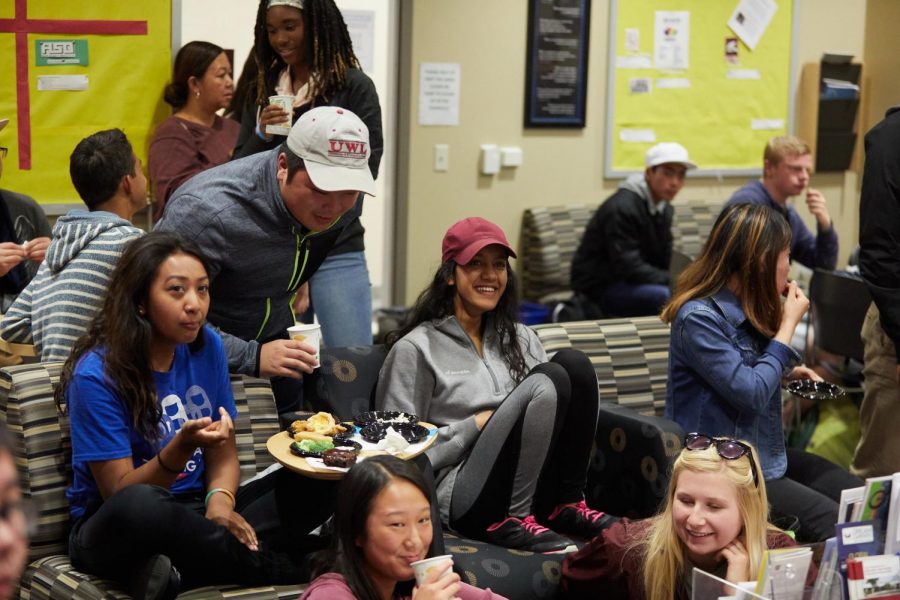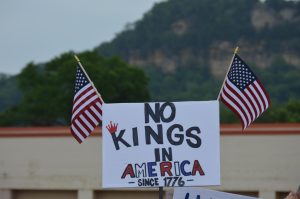Office of Multicultural Student Services celebrates 50 years
March 8, 2021
The University of Wisconsin-La Crosse Office of Multicultural Student Services (OMSS) celebrates its 50th anniversary this year. OMSS is a department of the Division of Diversity & Inclusion and oversees numerous initiatives and programs with the goal of supporting and encouraging the academic excellence, leadership, and personal and social development of students of diverse races and ethnicities.
Some of these programs include the Academic Success Institute summer program, multiple multicultural student pre-collegiate programs, financial support resources to multicultural students, peer tutoring, the multicultural business scholars’ program, and the Hekima scholars’ program. OMSS also oversees and provides support to eight multicultural student organizations.
To better understand the roles and presence of what was then known as The Office of Minority Affairs, The Racquet Press interviewed Assistant Director Antoiwana Williams and Assistant Director Thomas Harris, as well as former UWL history and women’s studies professor Dr. James Parker.
Dr. Parker arrived at UWL in the late 1960s, and he said he immediately saw a lack of programming for multicultural students. “When I arrived on campus in 1968, there was no programming of any sort. None. And one of the first things that happened was I had students in class who said, ‘in history, there’s no history of African Americans or Native Americans.’” Parker offered a course in African American studies the following summer, followed soon after by another history professor who offered a course in Native American studies.
The ratio of white students to students of color was quite small at the time. Dr. Parker estimates there were around 100-120 students of color, mostly from schools in the inner city of Chicago.
From around 1968 through 1970, students and faculty began to see a need for multicultural programming. “Increasing numbers of students, along with a number of faculty in the history and English departments, suggested we have a permanent, organizational structure within the university to help recruit, retain, and provide academic background for students of color—and white students,” said Parker.
This was not easy to accomplish. Students and faculty pushing for the office, including Parker, were met with criticism and opposition by many administrative staff. “They opposed the concept of special courses, like African American history, because they said, ‘What would white history be?’ and we would respond by saying, ‘It’s every other history that you’ve been taught.’” Parker said of existing programming at the time, “There was basically nothing, and they [student affairs administration] didn’t want to see much of anything. And if anything did develop, they wanted to control what was taking place.”
According to Parker, Minority Affairs would never have come to be if it weren’t for the work of students in The Afro-American Student Association, a Black student organization that was founded in the mid-1960s which Parker was the first advisor to. It was these students, along with students in his classes and those of his colleagues, who began the push for inclusion that Parker and his colleagues were able to help realize.
The key to the office’s establishment was then Dean Carl Wimberly, who later went on to become Provost and then Vice Chancellor. “None of this would have happened at the time without his backing and financial support,” said Parker.
Despite multiple barriers, The Office of Minority Affairs was founded in 1971 and consisted of a program arm and an academic arm, which later became the department of Ethnic and Racial Studies. The original staff members consisted of Parker and two other history professors; George Carter and Bruce Mouser.
Over the next seven years, the department grew extensively and offered an array of programs. Parker said, “We had the third pre-collegiate program in the United States and the first in the state of Wisconsin in 1974. We had one of the first Native American tutorial services. We had a north-south exchange program with historically Black colleges and universities. We had a minority studies conference (which later became international) in which we invited some of the most prominent and outspoken people in the United States in the 1970s. We had a multicultural resource center for students and faculty. We obtained Department of Education grants ranging up to 500,000 dollars to establish programs on the campus to try to integrate and diversify the curriculum, we wrote the grants for special student services and for Upward Bound in 1977 and 1978, and there was a historical project called the Black Abolitionist Papers’ Project in which we were collecting the papers of Black abolitionists and trying to publish them.”
In 1978, however, Parker stepped down from his role to focus more on his teaching. This began a period of transition in the department where staff left or were replaced with administrative appointees, who, according to Parker, “acted as agents of the university rather than advocates for the students.”
In addition, the director that Parker and his colleagues had replaced themselves with, Gretchen Locket, resigned due to discriminatory ill-treatment from the administration. Parker said that this culminated in a 1985 investigation of racial discrimination on campus, which led to a re-structuring of the allocation of power at the university and allowed different staff members to join and oversee Minority Affairs. Parker said of Minority Affairs, “It did not become a fully realized organization until about 1985. Then it began to take the structural format that it now has.”
Thomas Harris came to UWL in the late 1980s. “I came here in 1988 as a graduate student after graduating from Steven’s Point. I was a nontraditional student. I had been in the service for three years before I came here.” Harris became involved in Minority Affairs through his assistantship, where he worked in the office. After his assistantship, Harris worked in the office of residence life on campus for several years before being hired as Assistant Director in 2003, at which time the office had been renamed.
According to Harris, the number of enrolled multicultural students has increased since he came to UWL. “What hasn’t changed, if you look at the percentage, is faculty and staff. Particularly the ratio of faculty of color has probably remained constant. You also have to look at the people in power positions and make comparisons.”
Harris said, “The more people of color who are working at UWL…. [the] more community involvement by people of color, who themselves are of course interacting with the systems that are created and led by white people in the community. We’re gradually seeing some change happening—not fast enough, but it’s happening.”
Antoiwana Williams is the current director of OMSS. “I actually joined as a student. I started in the summer of 1992 and eventually transitioned into a professional role in the office in 2000. I started as the Academic Success Institute summer bridge coordinator, then transitioned into various roles before becoming director in 2010.”
According to Williams, the office was significantly smaller compared to its size now. “When I came in, we didn’t have a big staff like we have now. We had a director, administrator, and then a pre-college director.”
According to Williams and Harris, OMSS now has six permanent staff members in addition to graduate students and provides support to nearly 1,000 multicultural students on the UWL campus.
When asked what the most rewarding part of the work is, Williams said, “The most rewarding part is to see the students walk across the stage, and finish, but not without a fight. They persevered through the ups and the downs; the good, the bad, the ugly; and they still decided that they wanted to call UWL their alma mater.” Williams continued, “We’ve still got a long way to go. The work is not done.”
According to Harris, being able to see a continued legacy of support is important to him. “For us to be supporting those young people just like we were supported by Dr. Parker and some other folks when we were students is a big thing.”
Parker said that the most rewarding aspect is to witness transformation. “No matter how much more there is to be done, you cannot imagine what it was like here for students of color in 1967, ‘68, and ‘69. To see young people who were colleagues and students and affiliates of mine transform into leaders in their community and in their university—nothing—nothing is more rewarding than that.”
OMSS is hosting its first-ever Crowdfunding campaign from March 1 through April 30, 2021, to celebrate 50 years of existence at UWL.
According to Williams, the objective is simple: to rally alums, friends, and family that share a passion for making UWL and the office of Multicultural Student Services better by helping them to create multicultural student scholarships. They aim to reach a $5,000 crowdfunding goal and build towards a $50,000 endowment.
Get all the details about the campaign here: OMSS 50 Year Crowdfunding Campaign.






